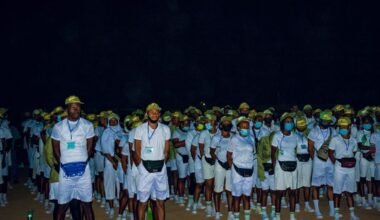The National Youth Service Corps (NYSC) was established on May 22, 1973, by the military government of General Yakubu Gowon through Decree No. 24. Created as part of the post-civil war reconciliation efforts, the scheme was designed to promote national unity, integration, and development by deploying Nigerian graduates to different parts of the country for a one-year mandatory service. Since its inception, NYSC has played a crucial role in fostering patriotism, cultural exchange, and youth empowerment across Nigeria. This article explores the history, objectives, and impact of the NYSC since its establishment over five decades ago.
History of NYSC: When Was NYSC Established And By Whom?
The National Youth Service Corps (NYSC) was officially established on May 22, 1973, through Decree No. 24, under the military administration of General Yakubu Gowon. This initiative was introduced as a strategic response to the deep divisions caused by the Nigerian Civil War (1967–1970), which had left the country fractured along ethnic and regional lines.
Post-War Reconciliation and the Birth of NYSC
After the civil war, Nigeria faced the enormous challenge of reintegrating the Igbo-dominated Eastern region (which had seceded as the Republic of Biafra) and healing the wounds of conflict. General Gowon’s government sought policies that would promote national unity, reconciliation, and development. The NYSC scheme was one of the key programs designed to achieve this goal.
The idea was to break down ethnic prejudices by mandating Nigerian graduates to serve in states outside their cultural and geographical origins. By living and working among people from different backgrounds, young Nigerians would develop a stronger sense of national identity.
The Legal Framework: Decree No. 24 of 1973
The NYSC was established under Decree No. 24, which later became the NYSC Act (Cap. N84, Laws of the Federation of Nigeria, 2004). The decree made it compulsory for all Nigerian graduates below the age of 30 to participate in a one-year national service, which includes:
-
Orientation Course – A three-week military-style training in a camp outside the graduate’s state of origin.
-
Primary Assignment – Deployment to institutions such as schools, hospitals, government agencies, or private firms.
-
Community Development Service (CDS) – Corps members initiate or contribute to projects that benefit their host communities.
General Yakubu Gowon’s Vision
General Gowon, Nigeria’s Head of State from 1966 to 1975, envisioned the NYSC as a tool for nation-building. His famous quote, “To keep Nigeria one is a task that must be done,” reflected the program’s core objective. By mixing young graduates from different ethnic groups, the NYSC would foster mutual understanding and reduce tribalism.
Evolution and Challenges
Over the years, the NYSC has evolved, facing both praise and criticism. While it has successfully promoted national integration and rural development, challenges such as:
-
Security risks in some regions
-
Underutilization of corps members’ skills
-
Calls for restructuring or scrapping the scheme
have sparked debates about its continued relevance. However, the program remains a vital part of Nigeria’s efforts to maintain unity.
Why Was NYSC Created?
The Nigerian Civil War (1967–1970) left the country deeply divided along ethnic and regional lines. To promote healing and national cohesion, General Gowon introduced the NYSC scheme with the following objectives:
-
National Unity – Encouraging Nigerian graduates to serve in states other than their own to foster understanding and tolerance.
-
Skill Development – Providing graduates with opportunities to contribute to national development through community service.
-
Economic Growth – Deploying young professionals to rural areas to support infrastructure and education.
The program mandates all Nigerian graduates below the age of 30 to participate in a one-year service, which includes:
-
Orientation Camp (3–4 weeks of military drills and skill acquisition)
-
Primary Assignment (Placement in schools, hospitals, government offices, or private firms)
-
Community Development Service (CDS) (Volunteer projects to benefit local communities)
For more details on the NYSC Act, you can visit the official NYSC website.
Impact of NYSC Since 1973
Since its establishment, NYSC has contributed to Nigeria’s development in several ways:
-
Promoting National Integration – Millions of graduates have served in different states, breaking ethnic barriers.
-
Rural Development – Corps members have built schools, health centers, and other projects in underserved areas.
-
Employment Opportunities – Many corps members secure permanent jobs through their service year placements.
Despite criticisms over security concerns and calls for reforms, NYSC remains a vital part of Nigeria’s nation-building efforts.
Conclusion
The NYSC was established on May 22, 1973, by General Yakubu Gowon as a tool for national unity after the Nigerian Civil War. Over the years, it has helped bridge ethnic divides, empower communities, and provide valuable experience for young graduates. While debates about its relevance continue, the program remains a key institution in Nigeria’s socio-economic framework.
For more information on NYSC’s history and policies, you can check resources from Nigerian Muse or Premium Times.







